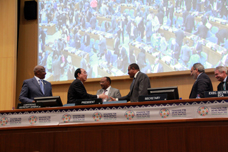FFD3 outcome sets positive tone for global change
The Addis Ababa Conference was the first in a series of landmark events leading up to the adoption of a new development agenda and a universal agreement on climate change by the end of this year. The successful outcome gave important positive momentum to the last stretch of negotiations on the post-2015 development agenda, which with a to be adopted by Member States at the in September in New York.
Turning needs into investment opportunities
‚ÄúFinancing needs for sustainable development are high, but the challenges are surmountable,‚ÄĚ said UN secretary-General Ban Ki-moon at the opening of the Conference. ‚ÄúThe Addis Ababa Action Agenda will help to turn these needs into investment opportunities.‚ÄĚ
 At FFD3, governments agreed on a package of over 100 concrete measures that draw upon all sources of finance, technology, innovation, trade and data and that will support the implementation the Sustainable Development Goals.
At FFD3, governments agreed on a package of over 100 concrete measures that draw upon all sources of finance, technology, innovation, trade and data and that will support the implementation the Sustainable Development Goals.
‚ÄúThis framework is a basis both for financing sustainable development and for developing sustainable finance,‚ÄĚ said Mr Wu Hongbo, UN DESA‚Äôs Under-Secretary-General and Conference Secretary-General.
Collaborating on the formation of breakthrough commitments
Through plenary meetings, round tables, bilateral meetings and almost 200 side events, the various stakeholders in international development ‚Äď Governments, financial and trade institutions, civil society and business sector entities ‚Äď got the opportunity to collaborate on the formation of breakthrough commitments and goals across the development spectrum.
As part of the Addis Ababa Action Agenda, countries committed to a new social compact to provide social protection and essential public services for all; a global infrastructure forum to bridge the infrastructure gap; an ‚ÄėLDC package‚Äô to support the poorest countries; a Technology Facilitation Mechanism to advance to the SDGs; enhanced international tax cooperation to assist in raising resources domestically; and mainstreaming women‚Äôs empowerment into financing for development.
Making Addis a turning point for development
‚ÄúThe target date for the realization of the SDGs may seem far and yet close, depending the perspective,‚ÄĚ said Ellen Johnson Sirleaf, President of the Republic of Liberia, in her address during the plenary meeting.¬† ‚ÄĚWhat is certain is that the world has the resources and capacity to achieve every goal. We have an opportunity to make Addis Ababa a turning point in the scope and character of global framework for development cooperation. Indeed many of the measures incorporated [‚Ķ] are long sought after goals.‚ÄĚ
 The weeklong gathering was attended by 24 Heads of State and Government and Deputies, and more than one hundred Ministers of Finance, Foreign Affairs and Development Cooperation and Deputies, as well as other high ranking Government officials from 174 countries.
The weeklong gathering was attended by 24 Heads of State and Government and Deputies, and more than one hundred Ministers of Finance, Foreign Affairs and Development Cooperation and Deputies, as well as other high ranking Government officials from 174 countries.
Many heads of UN agencies and senior representatives of international organizations took part in the Conference as well, in addition to more than 600 civil society organizations and networks and more than 400 business representatives.
It is expected that the consensus reached on the Addis Agenda and the Sustainable Development Goals will provide momentum for the negotiations on a new binding climate change treaty to culminate at the .
Source: &

